Making lesson plans for speech therapy doesn’t have to be hard. Using themes, let me show you how I plan my therapy sessions, and give you a free planning sheet to help you!
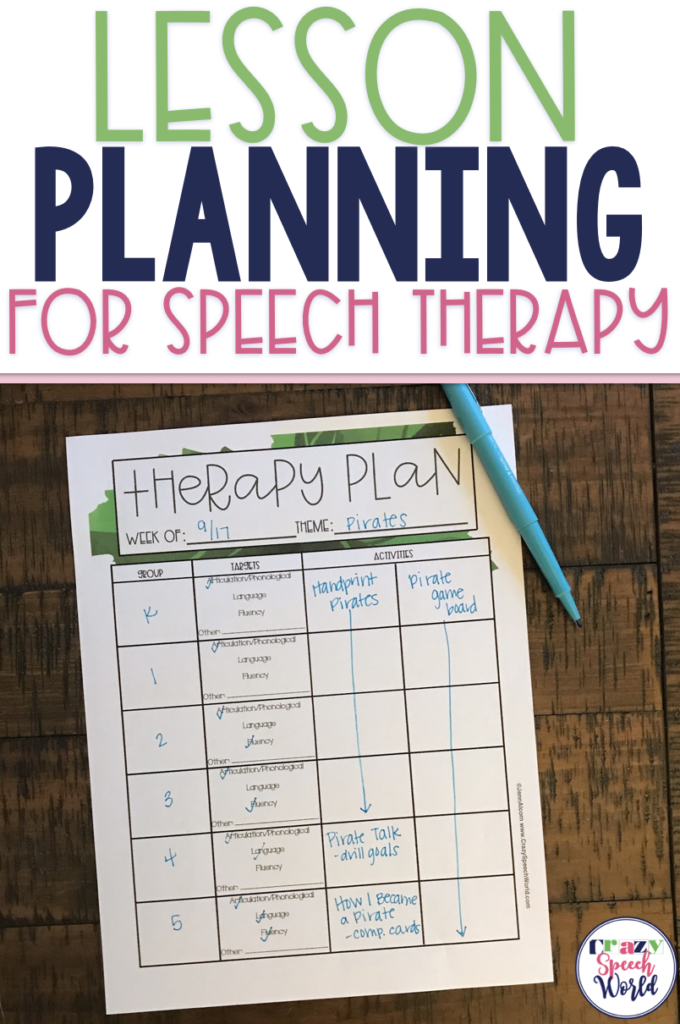
Making lesson plans is one of those things that seems to be either you or you don’t. Being 100% honest, I don’t always have the time to make lesson plans and I sometimes wing it. Having done both, here’s what I know to be true: When I take the time to plan out my therapy sessions, I know that I am giving students better quality instruction because it’s much more thought out.
It also significantly decreases my stress levels because I don’t have to worry about what’s next. It’s hard though, I have to be intentional with the process, and that doesn’t come naturally to this procrastinator. Also, I have to turn my lesson plans in at the end of the year…. soooo…. yeah …. #documentationislife
So the question becomes, how do you do it? The first thing I do is decide on an overall theme. I have used these theme calendars for quite a few years and it just works for me and my brain. These days I do a lot of my plans around the books I am using, but the books are usually related to a theme. Why themes? Read more here.
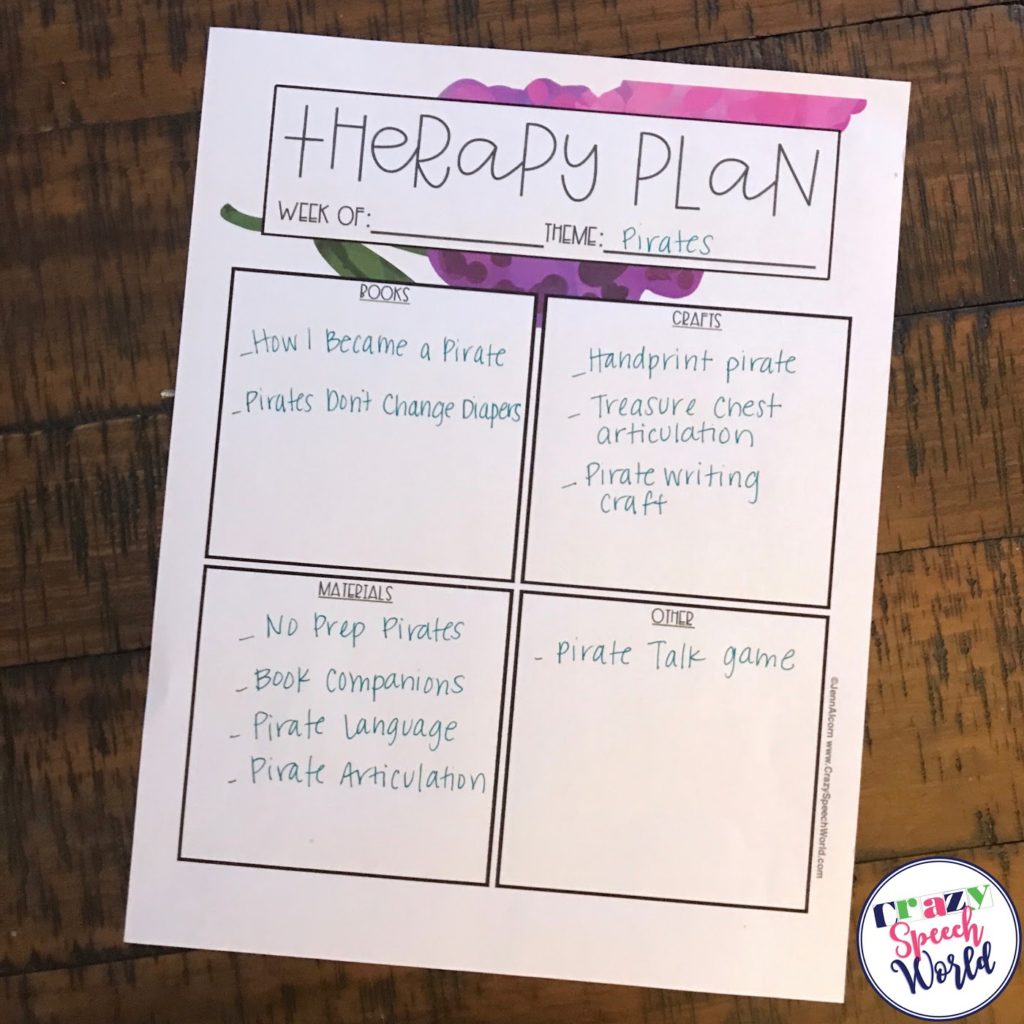
Once I know my theme, I see what materials, books, and games that I have related to the theme. I have these pages from my SLP Planner, that I keep in a binder that has everything I own related to each theme. It’s easy to forget what we have, so these sheets really help me keep on top of it! I definitely supplement with things that are not theme-related, not everything I do is theme-based.
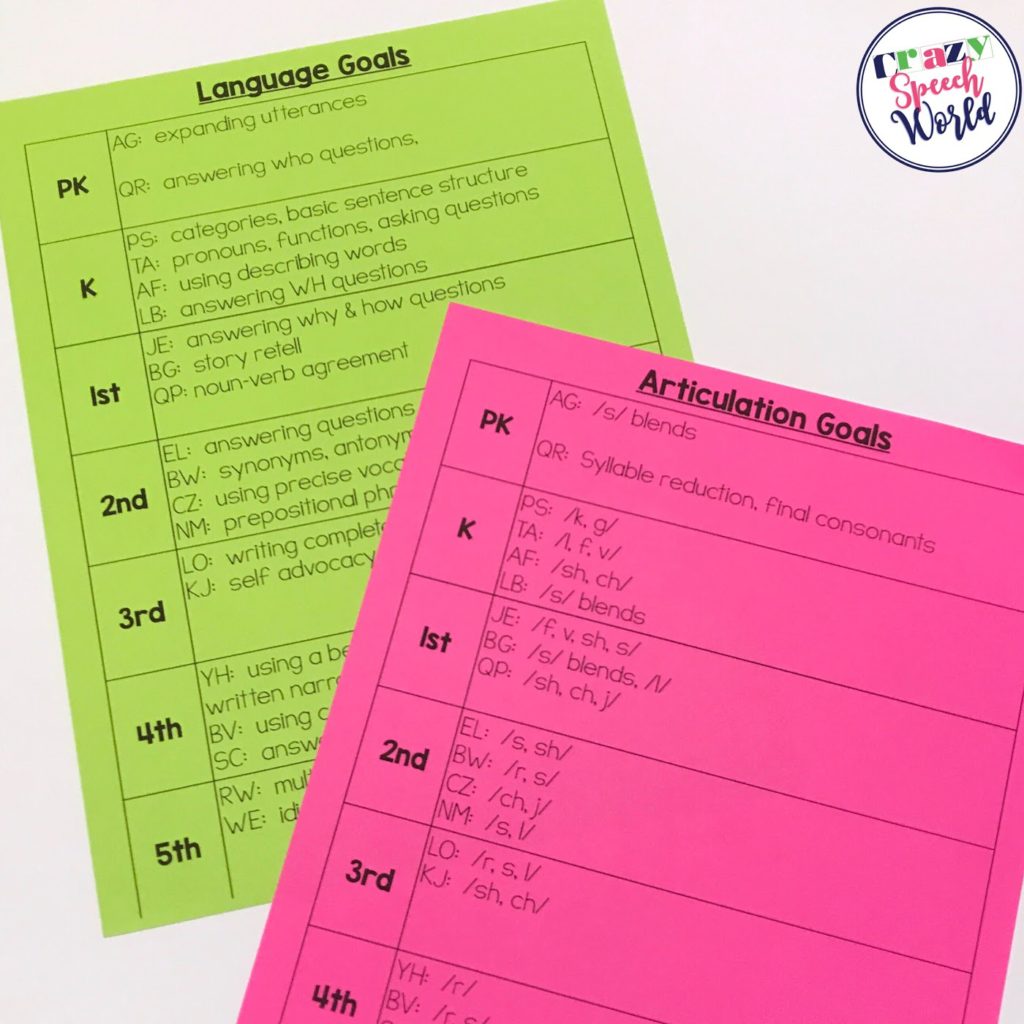
My next task is to look at my student’s goals and see what we need to work on that week. I keep two lists of goals for each grade level, one for articulation and one for language, so I always know what I need to target (The above is just an example of what it looks like!). I use that, paired with my available materials, to see what we should do in each session.
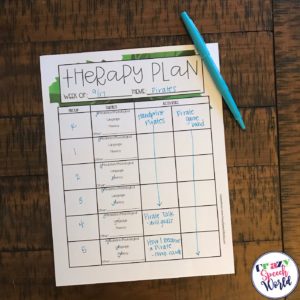
I have my schedule structured so that I see (mostly) articulation students on Mondays/Wednesdays and (mostly) language students on Tuesdays/Fridays. To make things easier on myself, I will often choose one activity to use all day long on articulation days. I try to switch things up by doing different types of activities from week to week. Each month we cycle through using dice, daubers, coloring, game boards, and crafts. I don’t play boxed games very often, but maybe once a month. I like to do things that are able to keep their hands and minds busy while they are waiting for their turn when we are doing a lot of drilling.
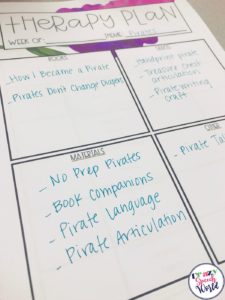
For language, I will do a couple of books, depending on the grade level, and pair them with other materials like book companions as needed. When I start a new lesson plan for a book, I am usually able to loosely plan out several sessions. Books usually last me a couple of weeks because I can address so many goals using one! I might need to change things around depending on how my students are doing with the skills we are working on, they may need more or less time. I just follow their lead.
Need some help getting going in the right direction? Grab my therapy plan organizing page for FREE below




![Using open ended activities and games in speech therapy can make planning sessions so much easier! Here are a few suggestions that worked well for me. Do you remember the first time you were faced with a mixed group and were realllllllllly unsure about what to do? I do… picture it, St. Augustine 2007 😅 I was […]](https://i.pinimg.com/236x/db/72/cf/db72cf1f6f5da00cb2a13a90872871ea.jpg)
![Using open ended activities and games in speech therapy can make planning sessions so much easier! Here are a few suggestions that worked well for me. Do you remember the first time you were faced with a mixed group and were realllllllllly unsure about what to do? I do… picture it, St. Augustine 2007 😅 I was […]](https://i.pinimg.com/236x/ae/c5/56/aec55688010e2d3489baf744dde59582.jpg)
![Using open ended activities and games in speech therapy can make planning sessions so much easier! Here are a few suggestions that worked well for me. Do you remember the first time you were faced with a mixed group and were realllllllllly unsure about what to do? I do… picture it, St. Augustine 2007 😅 I was […]](https://i.pinimg.com/236x/18/b9/e8/18b9e80227dfe1789e20a21629254f79.jpg)
![Using open ended activities and games in speech therapy can make planning sessions so much easier! Here are a few suggestions that worked well for me. Do you remember the first time you were faced with a mixed group and were realllllllllly unsure about what to do? I do… picture it, St. Augustine 2007 😅 I was […]](https://i.pinimg.com/236x/4d/34/85/4d3485a753178d000223a89b09162317.jpg)
![Using open ended activities and games in speech therapy can make planning sessions so much easier! Here are a few suggestions that worked well for me. Do you remember the first time you were faced with a mixed group and were realllllllllly unsure about what to do? I do… picture it, St. Augustine 2007 😅 I was […]](https://i.pinimg.com/236x/da/7b/c1/da7bc16b9530451d989a578236bc2bff.jpg)
![Using open ended activities and games in speech therapy can make planning sessions so much easier! Here are a few suggestions that worked well for me. Do you remember the first time you were faced with a mixed group and were realllllllllly unsure about what to do? I do… picture it, St. Augustine 2007 😅 I was […]](https://i.pinimg.com/236x/e0/21/a4/e021a465474b16201d23d0a77857935b.jpg)
![Using open ended activities and games in speech therapy can make planning sessions so much easier! Here are a few suggestions that worked well for me. Do you remember the first time you were faced with a mixed group and were realllllllllly unsure about what to do? I do… picture it, St. Augustine 2007 😅 I was […]](https://i.pinimg.com/236x/fa/94/be/fa94be15b6f184b64e2e408bc762a7e8.jpg)

Count not open the organizing freebie. Is there another way to access it?
Hi Jen, here is the link: https://www.dropbox.com/s/vfkfs8c06xjzzmh/Therapy%20Planing%20Freebie.pdf?dl=0
Hi Jenn! Are you offering the other therapy planning sheet used in this post? Thanks in advance!
Hi Chelsey! It’s included in my SLP Planner 🙂 https://www.teacherspayteachers.com/Product/SLP-Planner-2018-19-2604302